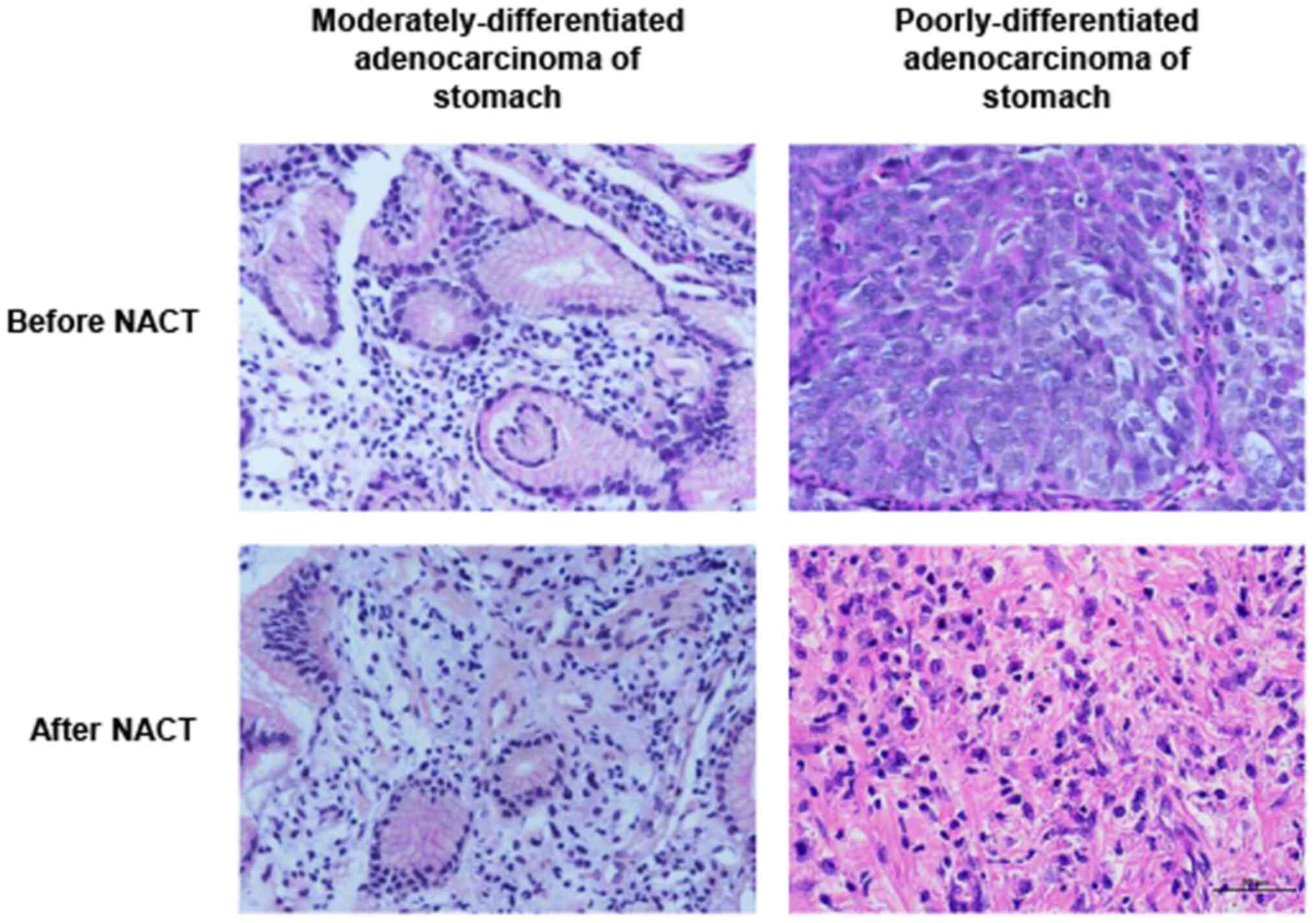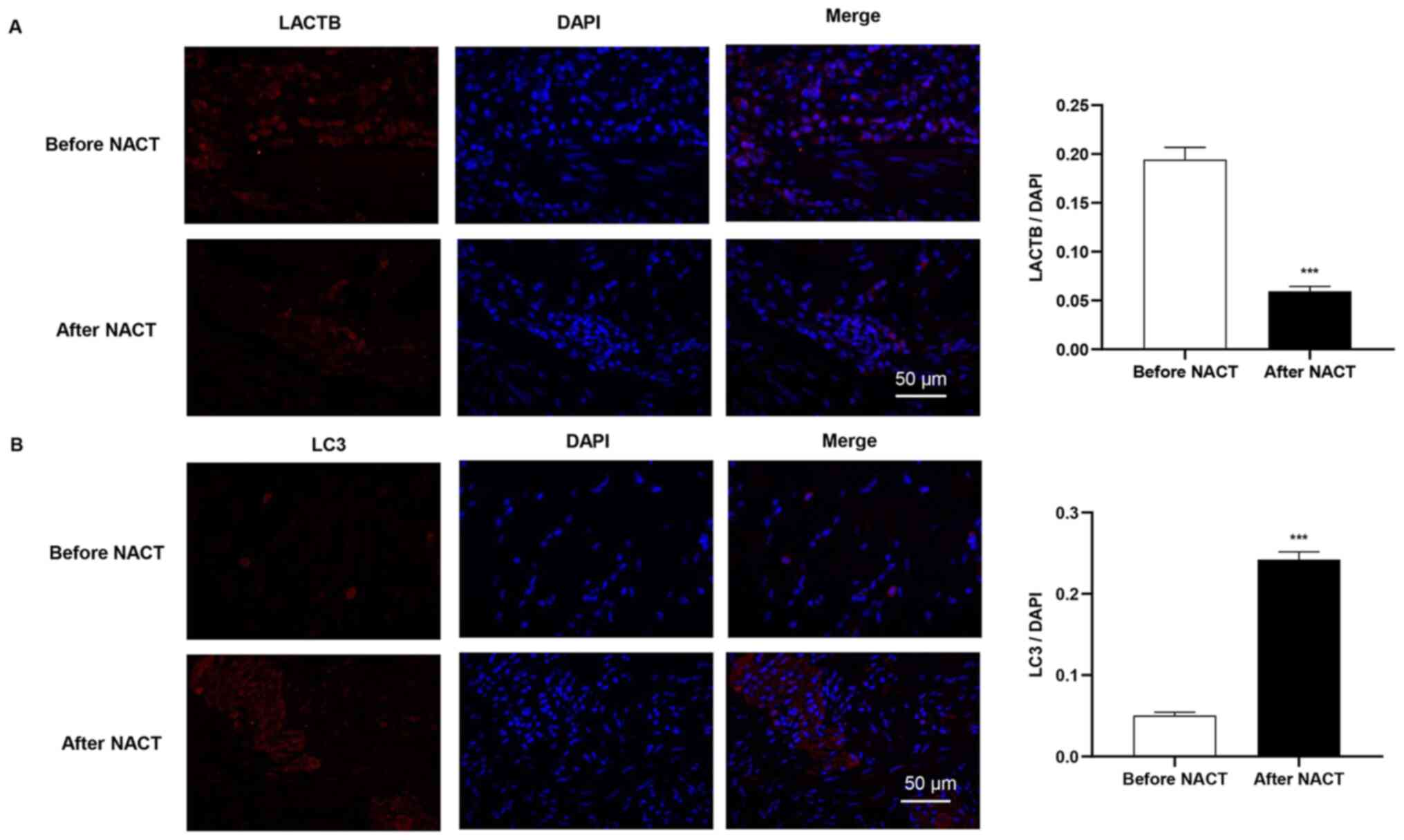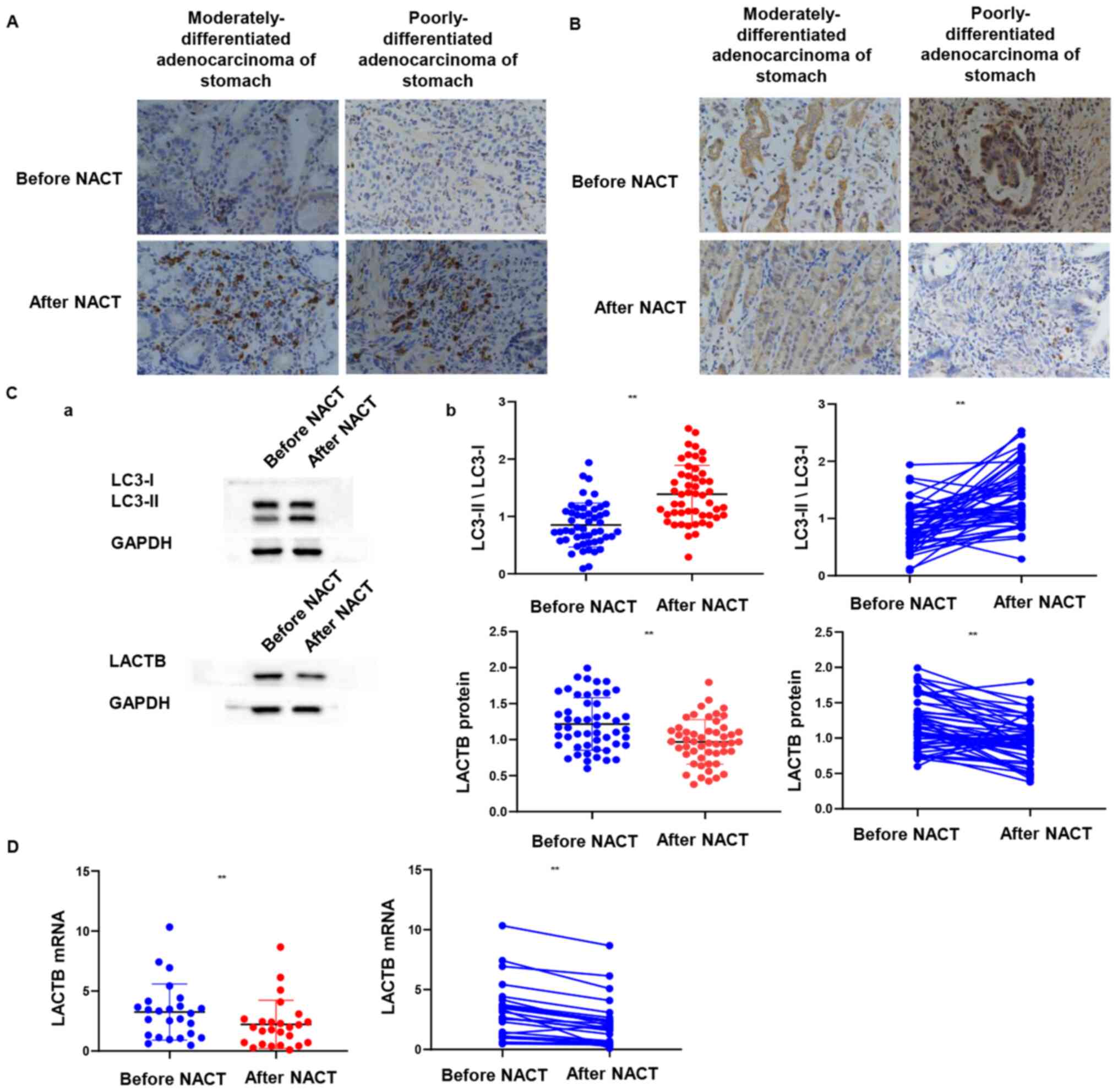|
1
|
Lott PC and Carvajal-Carmona LG: Resolving
gastric cancer aetiology: An update in genetic predisposition.
Lancet Gastroenterol Hepatol. 3:874–883. 2018. View Article : Google Scholar : PubMed/NCBI
|
|
2
|
Tan Z: Recent advances in the surgical
treatment of advanced gastric cancer: A review. Med Sci Monit.
25:3537–3541. 2019. View Article : Google Scholar : PubMed/NCBI
|
|
3
|
Derks MGM and van de Velde CJH:
Neoadjuvant chemotherapy in breast cancer: More than just
downsizing. Lancet Oncol. 19:2–3. 2018. View Article : Google Scholar : PubMed/NCBI
|
|
4
|
Das M: Neoadjuvant chemotherapy: Survival
benefit in gastric cancer. Lancet Oncol. 18:e3072017. View Article : Google Scholar : PubMed/NCBI
|
|
5
|
Akateh C, Black SM, Conteh L, Miller ED,
Noonan A, Elliott E, Pawlik TM, Tsung A and Cloyd JM: Neoadjuvant
and adjuvant treatment strategies for hepatocellular carcinoma.
World J Gastroenterol. 25:3704–3721. 2019. View Article : Google Scholar : PubMed/NCBI
|
|
6
|
Wei X, Duan W, Li Y, Zhang S, Xin X, Sun
L, Gao M, Li Q and Wang D: AT101 exerts a synergetic efficacy in
gastric cancer patients with 5-FU based treatment through promoting
apoptosis and autophagy. Oncotarget. 7:34430–34441. 2016.
View Article : Google Scholar : PubMed/NCBI
|
|
7
|
Liu M, Li CM, Chen ZF, Ji R, Guo QH, Li Q,
Zhang HL and Zhou YN: Celecoxib regulates apoptosis and autophagy
via the PI3K/Akt signaling pathway in SGC-7901 gastric cancer
cells. Int J Mol Med. 33:1451–1458. 2014. View Article : Google Scholar : PubMed/NCBI
|
|
8
|
Masuda GO, Yashiro M, Kitayama K, Miki Y,
Kasashima H, Kinoshita H, Morisaki T, Fukuoka T, Hasegawa T,
Sakurai K, et al: Clinicopathological correlations of
autophagy-related proteins LC3, beclin 1 and p62 in gastric cancer.
Anticancer Res. 36:129–136. 2016.PubMed/NCBI
|
|
9
|
Shida M, Kitajima Y, Nakamura J,
Yanagihara K, Baba K, Wakiyama K and Noshiro H: Impaired mitophagy
activates mtROS/HIF-1α interplay and increases cancer
aggressiveness in gastric cancer cells under hypoxia. Int J Oncol.
48:1379–1390. 2016. View Article : Google Scholar : PubMed/NCBI
|
|
10
|
Pascual G, Avgustinova A, Mejetta S,
Martín M, Castellanos A, Attolini CS, Berenguer A, Prats N, Toll A,
Hueto JA, et al: Targeting metastasis-initiating cells through the
fatty acid receptor CD36. Nature. 541:41–45. 2017. View Article : Google Scholar : PubMed/NCBI
|
|
11
|
Lu JB, Yao XX, Xiu JC and Hu YW:
MicroRNA-125b-5p attenuates lipopolysaccharide-induced monocyte
chemoattractant protein-1 production by targeting inhibiting LACTB
in THP-1 macrophages. Arch Biochem Biophys. 590:64–71. 2016.
View Article : Google Scholar : PubMed/NCBI
|
|
12
|
Enjoji M, Kohjima M, Ohtsu K, Matsunaga K,
Murata Y, Nakamuta M, Imamura K, Tanabe H, Iwashita A, Nagahama T
and Yao K: Intracellular mechanisms underlying lipid accumulation
(white opaque substance) in gastric epithelial neoplasms: A pilot
study of expression profiles of lipid-metabolism-associated genes.
J Gastroenterol Hepatol. 31:776–781. 2016. View Article : Google Scholar : PubMed/NCBI
|
|
13
|
Kim JH, Lee HH, Seo HS, Jung YJ and Park
CH: Borrmann type 1 cancer is associated with a high recurrence
rate in locally advanced gastric cancer. Ann Surg Oncol.
25:2044–2052. 2018. View Article : Google Scholar : PubMed/NCBI
|
|
14
|
Edge SB BD, Compton CC, Fritz AG, Greene
FL and Trotti A: AJCC cancer staging manual. 7th edition. Springer;
New York, NY: 2010
|
|
15
|
Armato SG III and Nowak AK: Revised
modified response evaluation criteria in solid tumors for
assessment of response in malignant pleural mesothelioma (version
1.1). J Thorac Oncol. 13:1012–1021. 2018. View Article : Google Scholar : PubMed/NCBI
|
|
16
|
Jaffer S, Orta L, Sunkara S, Sabo E and
Burstein DE: Immunohistochemical detection of antiapoptotic protein
X-linked inhibitor of apoptosis in mammary carcinoma. Hum Pathol.
38:864–870. 2007. View Article : Google Scholar : PubMed/NCBI
|
|
17
|
Park JM, Huang S, Wu TT, Foster NR and
Sinicrope FA: Prognostic impact of Beclin 1, p62/sequestosome 1 and
LC3 protein expression in colon carcinomas from patients receiving
5-fluorouracil as adjuvant chemotherapy. Cancer Biol Ther.
14:100–107. 2013. View Article : Google Scholar : PubMed/NCBI
|
|
18
|
Xue C, He Y, Zhu W, Chen X, Yu Y, Hu Q,
Chen J, Liu L, Ren F, Ren Z, et al: Low expression of LACTB
promotes tumor progression and predicts poor prognosis in
hepatocellular carcinoma. Am J Transl Res. 10:4152–4162.
2018.PubMed/NCBI
|
|
19
|
Wang J, Pan XL, Ding LJ, Liu DY, Da-Peng L
and Jin T: Aberrant expression of beclin-1 and LC3 correlates with
poor prognosis of human hypopharyngeal squamous cell carcinoma.
PLoS One. 8:e690382013. View Article : Google Scholar : PubMed/NCBI
|
|
20
|
Papachristopoulou G, Tsapralis N,
Michaelidou K, Ardavanis-Loukeris G, Griniatsos I, Scorilas A and
Talieri M: Human kallikrein-related peptidase 12 (KLK12) splice
variants discriminate benign from cancerous breast tumors. Clin
Biochem. 58:78–85. 2018. View Article : Google Scholar : PubMed/NCBI
|
|
21
|
Ferlay J, Shin HR, Bray F and Mathers C:
GLOBOCAN 2008, cancer incidence and mortality worldwide: IARC
Cancer Base no. 10. International Agency for Research on Cancer;
Lyon: 2010
|
|
22
|
Yamada Y, Higuchi K, Nishikawa K, Gotoh M,
Fuse N, Sugimoto N, Nishina T, Amagai K, Chin K, Niwa Y, et al:
Phase III study comparing oxaliplatin plus S-1 with cisplatin plus
S-1 in chemotherapy-naive patients with advanced gastric cancer.
Ann Oncol. 26:141–148. 2015. View Article : Google Scholar : PubMed/NCBI
|
|
23
|
Li T and Chen L: Efficacy and safety of
SOX regimen as neoadjuvant chemotherapy for advanced gastric
cancer. Zhonghua Wei Chang Wai Ke Za Zhi. 14:104–106. 2011.(In
Chinese). PubMed/NCBI
|
|
24
|
Yoshioka A, Miyata H, Doki Y, Yamasaki M,
Sohma I, Gotoh K, Takiguchi S, Fujiwara Y, Uchiyama Y and Monden M:
LC3, an autophagosome marker, is highly expressed in
gastrointestinal cancers. Int J Oncol. 33:461–468. 2008.PubMed/NCBI
|
|
25
|
Kimmelman AC and White E: Autophagy and
tumor metabolism. Cell Metab. 25:1037–1043. 2017. View Article : Google Scholar : PubMed/NCBI
|
|
26
|
Amaravadi R, Kimmelman AC and White E:
Recent insights into the function of autophagy in cancer. Genes
Dev. 30:1913–1930. 2016. View Article : Google Scholar : PubMed/NCBI
|
|
27
|
Hu YL, Jahangiri A, Delay M and Aghi MK:
Tumor cell autophagy as an adaptive response mediating resistance
to treatments such as antiangiogenic therapy. Cancer Res.
72:4294–4299. 2012. View Article : Google Scholar : PubMed/NCBI
|
|
28
|
Lee YJ, Hah YJ, Kang YN, Kang KJ, Hwang
JS, Chung WJ, Cho KB, Park KS, Kim ES, Seo HY, et al: The
autophagy-related marker LC3 can predict prognosis in human
hepatocellular carcinoma. PLoS One. 8:e815402013. View Article : Google Scholar : PubMed/NCBI
|
|
29
|
Wang X, Wu WKK, Gao J, Li Z, Dong B, Lin
X, Li Y, Li Y, Gong J, Qi C, et al: Autophagy inhibition enhances
PD-L1 expression in gastric cancer. J Exp Clin Cancer Res.
38:1402019. View Article : Google Scholar : PubMed/NCBI
|
|
30
|
Cao Y, Luo Y, Zou J, Ouyang J, Cai Z, Zeng
X, Ling H and Zeng T: Autophagy and its role in gastric cancer.
Clin Chim Acta. 489:10–20. 2019. View Article : Google Scholar : PubMed/NCBI
|
|
31
|
Kim JS, Bae GE, Kim KH, Lee SI, Chung C,
Lee D, Lee TH, Kwon IS and Yeo MK: Prognostic significance of LC3B
and p62/SQSTM1 expression in gastric adenocarcinoma. Anticancer
Res. 39:6711–6722. 2019. View Article : Google Scholar : PubMed/NCBI
|
|
32
|
Zhang J, He Y, Yu Y, Chen X, Cui G, Wang
W, Zhang X, Luo Y, Li J, Ren F, et al: Upregulation of miR-374a
promotes tumor metastasis and progression by downregulating LACTB
and predicts unfavorable prognosis in breast cancer. Cancer Med.
7:3351–3362. 2018. View Article : Google Scholar : PubMed/NCBI
|
|
33
|
Li HT, Dong DY, Liu Q, Xu YQ and Chen L:
Overexpression of LACTB, a mitochondrial protein that inhibits
proliferation and invasion in glioma cells. Oncol Res. 27:423–429.
2019. View Article : Google Scholar : PubMed/NCBI
|
|
34
|
Zeng K, Chen X, Hu X, Liu X, Xu T, Sun H,
Pan Y, He B and Wang S: LACTB, a novel epigenetic silenced tumor
suppressor, inhibits colorectal cancer progression by attenuating
MDM2-mediated p53 ubiquitination and degradation. Oncogene.
37:5534–5551. 2018. View Article : Google Scholar : PubMed/NCBI
|
|
35
|
Yan C and Li TS: Dual role of mitophagy in
cancer drug resistance. Anticancer Res. 38:617–621. 2018.PubMed/NCBI
|
|
36
|
Cichocka-Radwan A and Lelonek M: Annual
prognostic factors in chronic heart failure in patients over 80
years old. Kardiol Pol. 75:164–173. 2017.PubMed/NCBI
|
|
37
|
Echeverria GV, Ge Z, Seth S, Zhang X,
Jeter-Jones S, Zhou X, Cai S, Tu Y, McCoy A, Peoples M, et al:
Resistance to neoadjuvant chemotherapy in triple-negative breast
cancer mediated by a reversible drug-tolerant state. Sci Transl
Med. 11:eaav09362019. View Article : Google Scholar : PubMed/NCBI
|
|
38
|
Glasgow MA, Argenta P, Abrahante JE,
Shetty M, Talukdar S, Croonquist PA, Khalifa MA and Starr TK:
Biological insights into chemotherapy resistance in ovarian cancer.
Int J Mol Sci. 20:21312019. View Article : Google Scholar : PubMed/NCBI
|
|
39
|
Buttigliero C, Tucci M, Vignani F,
Scagliotti GV and Di Maio M: Molecular biomarkers to predict
response to neoadjuvant chemotherapy for bladder cancer. Cancer
Treat Rev. 54:1–9. 2017. View Article : Google Scholar : PubMed/NCBI
|

















